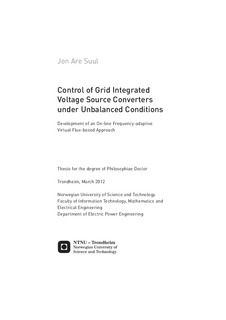Control of Grid Integrated Voltage Source Converters under Unbalanced Conditions: Development of an On-line Frequency-adaptive Virtual Flux-based Approach
Doctoral thesis
Permanent lenke
http://hdl.handle.net/11250/257234Utgivelsesdato
2012Metadata
Vis full innførselSamlinger
- Institutt for elkraftteknikk [2437]
Sammendrag
Three-Phase Voltage Source Converters (VSCs) are finding widespread applications in grid integrated power conversion systems. The control systems of such VSCs are in an increasing number of these applications required to operate during voltage disturbances and unbalanced conditions. Control systems designed for grid side voltagesensor- less operation are at the same time becoming attractive due to the continuous drive for cost reduction and increased reliability of VSCs, but are not commonly applied for operation during unbalanced conditions. Methods for voltage-sensor-less grid synchronization and control of VSCs under unbalanced grid voltage conditions will therefore be the main focus of this Thesis.
Estimation methods based on the concept of Virtual Flux, considering the integral of the converter voltage in analogy to the flux of an electric machine, are among the simplest and most well known techniques for achieving voltage-sensor-less grid synchronization. Most of the established techniques for Virtual Flux estimation are, however, either sensitive to grid frequency variations or they are not easily adaptable for operation under unbalanced grid voltage conditions. This Thesis addresses both these issues by proposing a simple approach for Virtual Flux estimation by utilizing a frequency-adaptive filter based on a Second Order Generalized Integrator (SOGI). The proposed approach can be used to achieve on-line frequency-adaptive varieties of conventional strategies for Virtual Flux estimation. The main advantage is, however, that the SOGI-based Virtual Flux estimation can be arranged in a structure that achieves inherent symmetrical component sequence separation under unbalanced conditions.
The proposed method for Virtual Flux estimation can be used as a general basis for voltage-sensor-less grid synchronization and control during unbalanced conditions. In this Thesis, the estimated Virtual Flux signals are used to develop a flexible strategy for control of active and reactive power flow, formulated as generalized equations for current reference calculation. A simple, but general, implementation is therefore achieved, where the control objective and the power flow characteristics can be selected according to the requirements of any particular application. Thus, the same control structure can be used to achieve for instance balanced sinusoidal currents or elimination of double frequency active power oscillations during unbalanced conditions.
In case of voltage sags, current references corresponding to a specified active or reactive power flow might exceed the current capability of the converter. The limits for active and reactive power transfer during unbalanced conditions have therefore been analyzed, and generalized strategies for current reference calculation when operating under current limitations have been derived. The specified objectives for active and reactive power flow characteristics can therefore be maintained during unbalanced grid conditions, while the average active and reactive power flow is limited to keep the current references within safe values.
All concepts and techniques proposed in this Thesis have been verified by simulations and laboratory experiments. The SOGI-based method for Virtual Flux estimation and the strategies for active and reactive power control with current limitation can also be easily adapted for a wide range of applications and can be combined with various types of inner loop control structures. Therefore, the proposed approach can potentially be used as a general basis for Virtual Flux-based voltage-sensor-less operation of VSCs under unbalanced grid voltage conditions.
